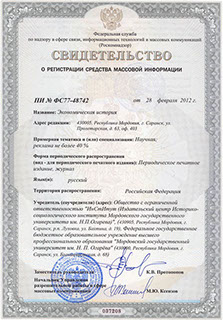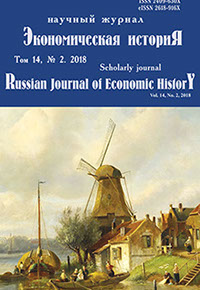Экономическая историЯ
Russian Journal of Economic History
ISSN 2409-630X (Print)
ISSN 2618-916X (Online)
Expert board:
- Scientific Council of RAS on economic history;
- Research and Educational Center «The economic history of Central Russia and the Middle Volga region» of Ogarev Mordovia State University;
- Center of Economic History of Lomonosov Moscow State University
Navigation
Certificate of registration

ISSN 2409-630X (Print), ISSN 2618-916X (Online)
DOI: 10.15507/2409-630X.041.014.201802.204-212
УДК 327:94(4)-339.982
Ruslan R. Nurislamov
Moscow State Regional University, (Moscow, Russia),
e-mail: ruslan.nurislamov89@mail.ru
ORCID: https://orcid.org/0000-0002-9383-798X
GREAT BRITAIN AND THE NAZI INTERVENTION IN THE SPANISH ECONOMY IN THE COURSE OF THE INITIAL PERIOD OF THE SPANISH CIVIL WAR 1936–1939
Introduction. This article deals with the relations between Great Britain and Germany in the context of Nazi penetration into the Spanish economy in the course of the initial period of civil war in Spain in 1936–1939. Materials and Methods. The research is based on the scientific findings formulated in the context of the political realism in the international relations theory and characterizes the national interests of Great Britain and Germany in the course of the Spanish conflict in accordance with this theoretical model. Results. Analyzing Anglo-Hispanic economic affairs, the author notes that Great Britain played a key role in the economy of Spain prior to the beginning of the civil war and thus was interested in early resolution of the conflict. Germany, in turn, didn’t originally take any sustainable economic interest in Spain, but it didn’t take Hitler long to realize that the preferences Berlin could gain for the military support for rebels might be instrumental in preparation for the future German expansion. The article shows how under the guidance of Nazi functionaries, the HISMA/ROWAK system was created, which carried out Nazi penetration into the Spanish economy, and, as a result of the spring-summer 1937 arrangements, Germany took a strong position in Spain. Referring to Great Britain’s response to Nazi penetration into the Spanish economy, it is pointed out that under the deteriorating conditions of the state of world affairs, British companies couldn’t watch the situation in Spain impartially. London, for fear of arousing open military confrontation with Germany and Italy, invested heavily in building connections with general Franco. The rebels, dissatisfied with excessive influence of Nazi Germany, responded to London’s proposals: privileges were re-turned to British companies, and in 1937, affiliated with the rebel government, the post of special representative on behalf of Great Britain was established. Discussion and Conclusions. The author concludes that the events in Spain revealed economic contradictions between Nazi Germany and Great Britain.
Keywords: Anglo-German relations, Anglo-Spanish relations, German-Spanish relations, Spanish Civil War of 1936–1939, origins of the Second World War, HISMA, ROWAK.
For citation: Ruslan R. Nurislamov. Great Britain and the Nazi Intervention in the Spanish Economy in the Course of the Initial period of the Spanish Civil War 1936–1939. Ekonomicheskaya istoriya = Russian Journal of Economic History. 2018; 14(2): 204–212. (In Russ.). DOI: 10.15507/2409-630X.040.014.201801.204-212
© Ogarev Mordovia State University. History and Sociology Institute, 2017
68, Of. 411, Bolshevistskaya St., 430005, The editorial office of the scholarly journal «Russian Journal of Economic History»
Tel.: (8342) 24-25-90; 27-07-11, Fax: (8342) 24-25-90, E-mail: jurnal-econom-hist@isi.mrsu.ru
Designed by A. Napalkov, Email: napalkov@isi.mrsu.ru

